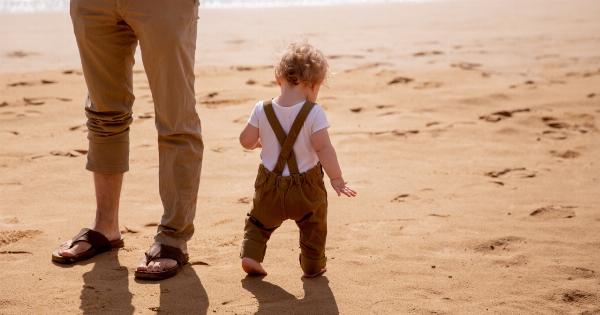Summer is a season that brings warm weather, sunny days, and plenty of outdoor activities. It is also a time when parents need to take extra precautions to protect their little ones from the heat and sun.
Babies have delicate skin that is more prone to damage from UV rays and heat-related illnesses. In this article, we will discuss the importance of protecting your baby during the summer months and provide essential tips for keeping them safe and comfortable.
Understanding the Risks
Before we dive into the tips for summer baby care, it is crucial to understand the risks associated with exposing babies to excessive heat and sun.
Babies have thinner and more sensitive skin than adults, making them more vulnerable to sunburns and overheating. Here are some of the risks you need to be aware of:.
1. Sunburns
Babies can get sunburned more easily than adults. Even a few minutes of direct sun exposure can lead to painful redness and blisters on their delicate skin.
Sunburns not only cause immediate discomfort but also increase the risk of long-term skin damage and skin cancer later in life.
2. Dehydration
Babies are more prone to dehydration due to their smaller size and higher metabolic rate. Hot weather can cause them to lose fluids more rapidly, leading to dehydration.
This can be dangerous and may result in symptoms like irritability, drowsiness, dry mouth, and decreased urine output.
3. Heat Exhaustion and Heatstroke
Heat exhaustion and heatstroke are severe heat-related illnesses that can be life-threatening for babies. Heat exhaustion symptoms include heavy sweating, fatigue, dizziness, and a rapid heartbeat.
If not addressed promptly, it can progress to heatstroke, which is a medical emergency and requires immediate attention.
Tips for Summer Baby Care
Now that you understand the risks, let’s look at some crucial tips for protecting your little one from the heat and sun:.
1. Dress Your Baby Appropriately
Choose lightweight, loose-fitting clothing made of breathable fabrics like cotton. Avoid synthetic materials that can trap heat and make your baby uncomfortable. Opt for light colors to reflect the sun’s rays and keep your baby cooler.
2. Use Sunscreen
Apply a broad-spectrum sunscreen with an SPF of 30 or higher to your baby’s exposed skin. Choose a formula specifically designed for babies and consult with your pediatrician before using any sunscreen on infants under six months old.
Reapply sunscreen every two hours, or more frequently if your baby is sweating or playing in water.
3. Seek Shade
Avoid direct sunlight during peak hours, typically between 10 a.m. and 4 p.m. If you’re outside, find shade under a tree, umbrella, or use a stroller canopy. Create a shady spot in your backyard by using a playpen or a portable baby tent.
4. Protect Their Head and Eyes
Put a wide-brimmed hat on your baby to shield their face, neck, and ears from direct sunlight. Look for hats with a UPF (ultraviolet protection factor) rating for added sun protection.
Additionally, use baby-sized sunglasses with UV protection to protect their delicate eyes.
5. Stay Hydrated
Never let your baby get dehydrated. Offer them breast milk, formula, or water frequently, even if they don’t seem thirsty. If your baby is younger than six months and exclusively breastfed, they usually do not require additional water.
For older babies, you can provide small sips of water to keep them hydrated.
6. Use Lightweight and Breathable Baby Carriers
If you use baby carriers, opt for lightweight and breathable ones that ensure proper airflow and prevent overheating. Look for carriers made of breathable fabrics like cotton or linen.
Avoid carriers that cover your baby’s face, as it may restrict airflow.
7. Be Mindful of Heatstroke Symptoms
Learn to recognize the signs of heat exhaustion and heatstroke in babies. If your baby appears excessively sweaty, lethargic, or has a rapid heartbeat, move them to a cool, shaded area immediately.
Use a damp cloth to cool their body and seek medical help if the symptoms worsen.
8. Limit Outdoor Activities
During extreme heatwaves, consider limiting outdoor activities. Instead, engage your baby in indoor or shaded playtime. If you plan to go out, choose cooler times of the day, such as early morning or late afternoon.
Always prioritize your baby’s well-being over outdoor activities.
9. Maintain a Cool Environment
Ensure your baby’s room or sleep area is kept cool by using fans, air conditioners, or open windows for proper ventilation. Avoid overdressing your baby for sleep and use lightweight blankets or sleep sacks designed for summer use.
10. Trust Your Parental Instincts
As a caregiver, you know your baby best. Trust your instincts and monitor their comfort levels closely. If you feel that your baby is overheating or uncomfortable, take immediate measures to cool them down and seek medical advice if needed.
By incorporating these tips into your summer baby care routine, you can ensure your little one stays protected from the heat and sun while enjoying the joys of the season.





























